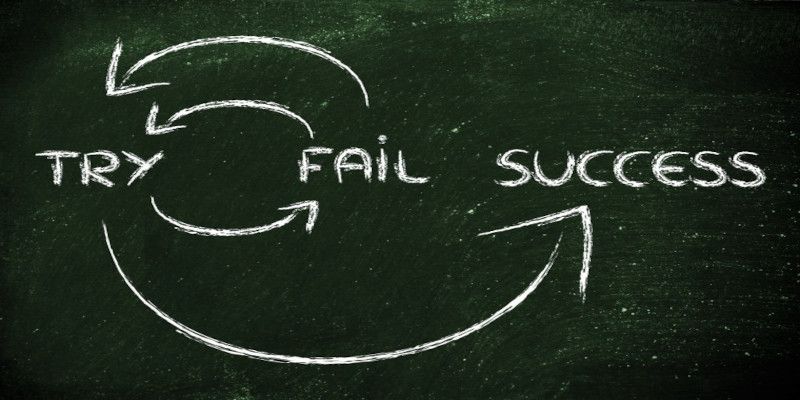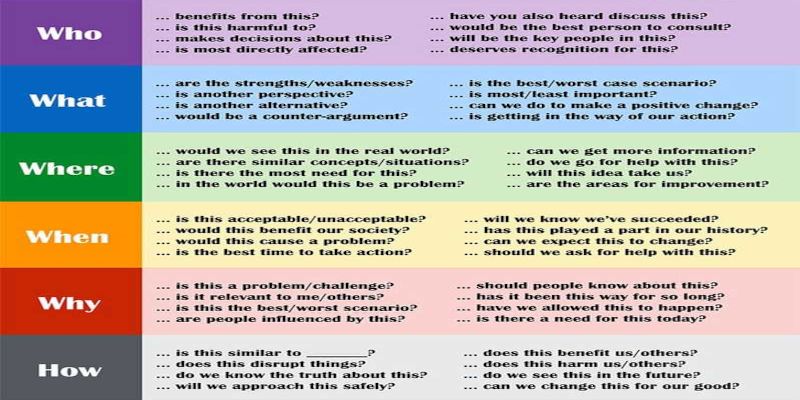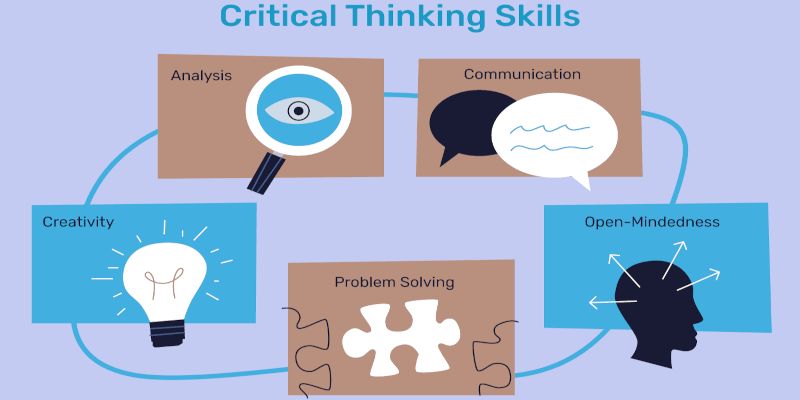Table of Contents
ToggleOur society is not encouraging people to think for themselves at all.
Yet, it’s of utmost importance to make the best decisions and to maintain a peaceful, cooperative society.
This is how to improve and apply critical thinking skills.
How do I learn to think and apply critical thinking?

Critical thinking can be hard to do since we’re all socially conditioned to a certain degree. Although some are far more than others.
I would say that you learn to think for yourself by subjecting every belief, thought, and idea that goes through your head to a critical and thorough analysis without any prejudices. Regardless of what you might want the answers and results to those questions to be.
It involves being introspective and practicing a critical thought process. This is a procedure that needs to be nurtured to learn how to apply it to every subject in your life. That inherently means that it’s not something that you can simply learn overnight and that it requires tons of effort and hours of dedication to master that skill.
Characteristics of critical thinking skills and problem-solving

Tempering your arrogance
If you are arrogant, then you hamper your ability to learn and to think logically.
Because why would you bother thinking at all if you already believe that you know everything there’s to know?
Being humble
You need to be humble enough to know and admit to yourself how much you don’t know, no matter how smart you might be.
Not only that, you need to be humble enough to admit that even though you might be a very rational person capable of strongly developed reasoning, you’re still highly susceptible to irrational, subjective thoughts, and thus, behavior as well.
Keeping an open mind
To get as close to the truth as humanly possible, we must keep an open mind.
If we can’t stay observative and impartial because we think we already know all the answers that life has to offer then we will start to lean towards arrogance. And we know that being overly prideful closes off our mind, and consequently, our ability to think critically.
Being brave enough to search for the truth

“The truth hurts before setting you free” is a phrase that’s simple, yet hits so close to home that it’s frightening.
People often take the easy road, and that means actively avoiding the things that can potentially hurt us.
And since the truth can be very psychologically painful, going after the facts despite knowing that it can upset you, and even put you down for the count, is something that requires a lot of bravery.
Looking at things rationally
Most of us think that we’re rational individuals ourselves. That’s not that surprising, because we like to think that we make conscious, well-thought-out decisions based on objective facts instead of being a slave to our emotions.
But that’s simply not the case. Even the most rational people are still highly subject to irrationality and subjective perspectives due to their fluctuating feelings.
So thinking and looking at things as neutral as possible is hard to do. Even for the most disciplined, non-biased people.
Seeking objective truths

Developing critical thinking skills involves seeking objective truths.
Sometimes, we hope and want things to turn out a certain way due to our individual, subjective views.
To think critically, we have to let go of our sometimes prejudiced personal perspectives to find or get as close to the facts as possible.
Setting aside your subjective views and beliefs
We’ve already briefly touched upon this subject in the previous point. To encounter the truth, you’ll have to set aside your subjective views and personal beliefs. Facts don’t lie and don’t care about your emotions or how you feel about a certain topic.
This is a hard thing to do for most people since our unverifiable orientations and beliefs are the very things that make up and define our personality.
This means that setting aside our personal views can feel like “losing” a part of ourselves. And sometimes, when we find out that our previous beliefs turn out to be wrong or suboptimal, this is exactly the case.
But losing this part of ourselves also means that we can rise and grow once more, becoming a better person as a result of burning off the unnecessary parts of ourselves that need to go.
That’s because it’s hard to evolve when we desperately cling to the past, unable to let go of times bygone, and unwilling to accept that life doesn’t stop, and keeps changing.
Frequently Asked Questions (FAQ)
What does critical thinking mean?

Critical thinking analysis is the investigation of facts rather than subjective truths to form a judgment that’s as close to the objective truth as humanly possible.
It’s focused and performed on the individual level. It is necessary to create an evaluative mind that is unafraid to question the validity of things and events.
Likewise, it is self-disciplined, self-focused, self-monitored, and self-directed. Critical thought means trying to engage in self-corrective thinking to prevent yourself from making mistakes and failing as a result.
Benefits of critical thinking

For your own personal health, fulfillment, and contentment
On the individual level, it’s vital for your health, fulfillment, and contentment that you learn to think critically.
Every person is unique, with their own personal goals, passions, strengths, and imperfections.
You should be able to think critically to find out what your passions and perks are and figure out what you want to do with your life.
Knowing and following your passions will create a sense of fulfillment and contentment while remaining healthy.
To better society as a whole

One of the benefits of employing fault-finding thinking is that it grants you the ability to better society as a whole.
If every person thinks critically and thus, improves as a person, then society is better off because people practice jobs and professions that they enjoy, and are passionate about.
All the benefits that the individual receives will pay dividends to the rest as well because people who follow their personal goals and dreams will benefit society too.
For example, do we want doctors who are passionate about helping others and improving their overall health, or do we want physicians who practice their job solely to earn a lot of money?
I’m willing to bet that the doctors who are enthusiastic and sympathize with those around them will give better advice and will be much finer physicians in the long term than the doctors practicing their job just for monetary gain.
That’s because those who do it only for the money typically don’t care one single bit about their patients, or what happens to them. Money is a factor, yet, it’s not good if it’s the only component that drives us to do something.
Keeps society from turning malevolent

If there’s a malevolent person in charge who tries to destabilize society for their gain, be it power or money, then we need to think critically.
If we don’t, then we can’t stand up for ourselves and the rest of society.
But imagine if we would all behave like a herd of sheep in this instance.
That malevolent leader will have a field day destabilizing society and turning it malevolent because the people simply follow their leadership without question. Unable to think critically and evaluate the leader’s actions for themselves.
Why is critical thinking important?

Where do I believe thinking critically is currently failing?

I think that learning to think critically is failing at the individual level, but more so at the educational and tutoring levels. One of the things you should avoid doing as a parent is not teaching your child to think critically.
Education
I think that both the education at school and home by the parents has largely moved away from teaching children and young adults to think for themselves while being capable of remaining rational.
If you think about it, society and people in a position of power have an easier time controlling the public who don’t necessarily think things through all that well.
Because if they do, people end up realizing that they are being oppressed, and not always valued and rewarded the way they should and deserve. That’s exactly why it’s in some people’s best interest (often those in power) to not teach individuals in society critical thinking abilities.
Still, I’m not saying that there aren’t great teachers and parents out there who are doing a fantastic job at educating those around them by teaching them to think for themselves, among many other vital traits.
Furthermore, I think it’s up to every individual in society, and not only the teachers and parents, to help people develop their critical thinking skills, and to spur them on in their journey to do so.
Critical thinking examples

A potential critical thinking example is a surgeon analyzing what the best surgery option is to get the best results while diminishing the risks and recovery time of the patient.
Or perhaps that a student who wants to become a doctor examines if they’re capable of doing so by reviewing certain textbooks, and what specialization is most suited to their personality and gifts.
Our final illustration is offering constructive criticism to make things better when there’s an issue at work, which involves critical thinking to reach that positive feedback.
Possible questions to promote critical thinking

- Who is this dangerous to?
- Why should people know about this?
- What is another point of view?
- Where in the universe would this be an issue?
- Who will be the central individuals in this?
- Who deserves acknowledgment for this?
- Why has it been this way for so long?
- Where would we see this in the real world?
- Why are people affected by this?
- Who benefits from this?
- When has this played a role in our past?
- Where are there similar ideas or situations?
- Where is there the most demand for this?
- What can we do to make a positive alteration?
- Where will this thought take us?
- Why is it pertinent to me and others?
- What is the most or least essential?
- Where are the areas for betterment?
- Why is this a difficulty?
- How can we change this for the better?
- Why is there a demand for this today?
- Who is most directly impacted?
- When will we know we’ve come through?
- Who have you also heard talk about this?
- Where can we get more info?

- What is another option?
- How will we draw close safely?
- What is getting in the way of action?
- When is this tolerable or intolerable?
- What would be a counterstatement?
- Where do we go for assistance with this?
- Why have we permitted this to happen?
- How does this interrupt things?
- When would this profit our society?
- How does this hurt us or others?
- Who would be the best person to inquire?
- How do we see this in the time to come?
- When is the best time to take action?
- How does this do good to us and others?
- What is the best or worst script?
- When can we expect this to switch?
- What are the strengths and failings?
- How are these things alike?
- How do we know the facts about this?
- Who makes choices about this?
- When would this cause trouble?
- Why is this the best or worst premise?
- When should we ask for aid with this?
Final take

We can conclude that critical thought is important to live a happy and successful life.
Developing a critical mind involves being capable of thinking for yourself while remaining as impartial as possible. That’s why learning to apply a critical thought process should be formed as early on in life as possible, and should be nurtured growing up.
Teaching people skills and values like respect and common decency is fine. But learning individuals how to think for themselves and to carefully analyze everything that’s going on in their existence is even better, and will last for a lifetime.






1 thought on “How to improve and apply critical thinking skills in life”
Comments are closed.